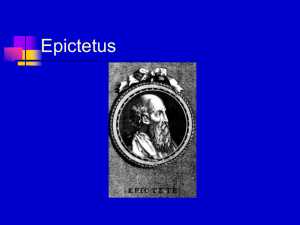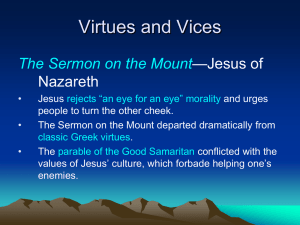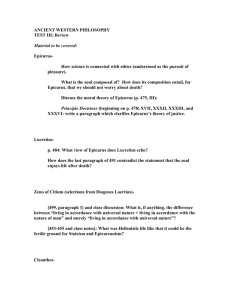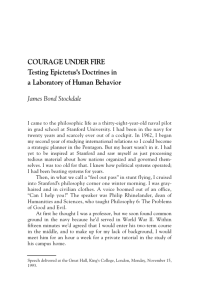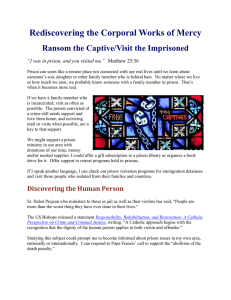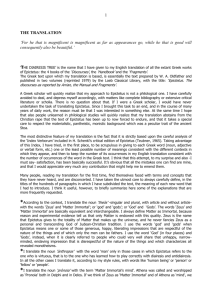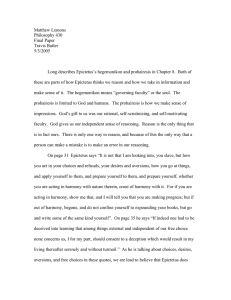Stockdale on Stoicism II: Master
advertisement
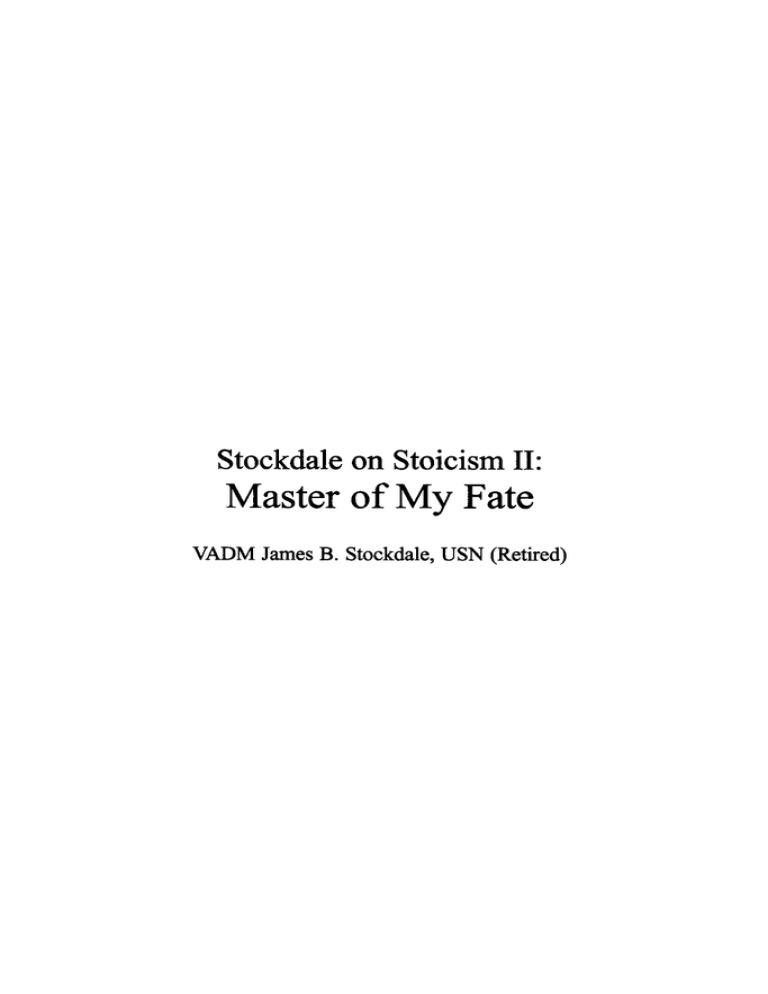
Stockdale on Stoicism II:
Master
of My
Fate
VADM JamesB. Stockdale, USN (Retired)
The views expressedin this report are those of the author and do not necessarily reflect
the official policy or position of the Department of the Navy, the Department ofDefense, or
the U .S. Government. This report is approved for public release; distribution unlimited.
Foreword
This is the second in a series of Occasional Paperspublished by the Center
for the Study of Professional Military Ethics. It shareswith the first occasional paper a common author-Vice Admiral JamesB. Stockdale-and a
common theme-the influence of Stoic philosophy on Admiral Stockdale's
life and career.
As you read these two papers, you will realize that Admiral Stockdale's
own description of himself (in the title of one of his books) rings true: He is a
"philosophical fighter pilot."
In this second paper, Admiral Stockdale takes us deeply, perhaps uncomfortably deeply, into the Hanoi prison where he was held captive for seven and
one-half years. This is Stoicism in practice, not just in theory. It is living
philosophy, not just teaching it. This is applied ethics, not merely ethics
in theory.
Early in 2001, the Naval Academy Alumni Association announcedthat
Admiral Stockdale had been selected to receive the Association 's Distinguished GraduateAward. This prestigious award is given to a living graduate
who has demonstrateda strong interest in supporting the Navy and the Naval
Academy, has provided a lifetime of service to the nation, and has made
significant contributions to the nation through public service.
This paper is a slightly edited version of an article by Admiral Stockdale
that first appearedin the May 1995 issue of The World and I magazine. It is
reprinted here with the kind permission of News World Communications, Inc
Albert C. Pierce
Director
Center for the Study of Professional Military Ethics
U.S. Naval Academy
1
Vice Admiral Stockdale served on active duty in the regular Navy for 37
years, most of those years as a fighter pilot aboard aircraft carriers. Shot
down on his third combat tour over North Vietnam, he was the senior naval
prisoner of war in Hanoi for seven and one-halfyears -tortured 15 times, in
solitary confmement for over four years, in leg irons for two.
When physical disability from combat wounds brought about Stockdale's
military retirement, he had the distinction of being the only three-star officer
in the history of the U.S. Navy to wear both aviator wings and the Medal of
Honor. Included in his 26 other combat decorations are two Distinguished
Plying Crosses,three Distinguished Service Medals, four Silver Star medals,
and two Purple Hearts.
As a civilian, Stockdale has been a college president (a year as President
of The Citadel), a college teacher (a lecturer in the philosophy department of
Stanford University), and a Senior ResearchFellow at the Hoover Institution
at Stanford for 15 years, a position from which he is now Emeritus. His
writings all converge on the central theme of how man can rise in dignity to
prevail in the face of adversity.
Besides numerous articles, he co-authored the book, In Love and War,
with his wife, Sybil (Harper and Row, 1984), now in its second revised and
updated edition {Naval Institute Press, 1990). NBC produced a dramatized
version of this book which appearedin 1987, starring JamesWood and Jane
Alexander. Admiral Stockdale has also written two books of essays:A Vietnam Experience: Ten Yearsof Reflection (Hoover Press, 1984), and Thoughts
of a Philosophical Fighter Pilot (Hoover Press, 1995). Both of the latter won
the Freedom Foundation at Valley Forge's George Washington Honor Medal
for books.
Upon his retirement from the Navy in 1979, the Secretary of the Navy
established the Vice Admiral James Stockdale Award for Inspirational Leadership, which is presented annually to two commanding officers, one in the
Atlantic Fleet and one in the Pacific Fleet. In 1989, Monmouth College in his
native state of Illinois, from which he entered the Naval Academy, named its
student union "Stockdale Center." The following year he was made a 1990
Laureate of the Abraham Lincoln Academy in Illinois in ceremonies at the
University of Chicago. He is an Honorary Fellow in the Society of Experimental Test Pilots. In 1993 he was inducted into the Carrier Aviation Hall of
Fame, and in 1995 was enshrined in the U .S. Naval Aviation Hall of Honor at
the National Museum of Aviation in Pensacola,Florida.
Admiral Stockdale holds
honorary
degrees.
A Stoic
Master
of My Fate:
Philosopher
in a Hanoi
Prison
When I debated Al Gore and Dan Quayle on television in October 1992,
as candidates for vice president, I began my remarks with two questions that
are perennially debated by every thinking human being: Who am I? Why am
I here? The questions were relevant in terms of the evening's purpose, which
was to introduce myself and let the American people know where I was
coming from. But I also chose them for their broader relevance to my life: I
am a philosopher.
I came to the philosophic life as a 38-year-old Navy pilot in graduate
school at Stanford University. I had been in the Navy for 20 years and
scarcely ever out of a cockpit. In 1962, I began my second year of studying
international relations so I could become a strategic planner in the Pentagon.
But my heart wasn't in it. Then I cruised into Stanford's philosophy corner
one winter morning and met Philip Rhinelander, dean of humanities and
sciences,who taught Philosophy 6, "The Problems of Good and Evil." Within
15 minutes, we had agreed that I would enter his two-term course in the
middle. To make up for my lack of background, I would meet him for an hour
a week for a private tutorial in the study of his campus home.
Phil Rhinelander opened my eyes. In that study, it all happenedfor memy inspiration, my dedication to the philosophic life. From then on, I was out
of international relations and into philosophy. We went from Job to Socrates
to Aristotle to Descartes. And then on to Kant, Hume, Dostoevsky, Camus.
On my last session,he reached high on his wall of books and brought down a
copy of the Enchiridion. He said, "1 think you '11be interested in this."
Epictetus and the Enchi,idion
Enchiridion means "ready at hand." In other words, it is a handbook. Its
author, Epictetus, was a very unusual man of intelligence and sensitivity who
gleaned wisdom rather than bitterness from his early fIrst-hand exposure to
extreme cruelty, the abuse ofpower, and self-indulgent debauchery.
Epictetus was born a slave around 50 A.D. At 15 he was sold at a slave
auction in Rome to Epaphroditus, a secretary to Emperor Nero. When
Epaphroditus helped Nero complete his suicide attempt, Epictetus was able to
venture out on his own. (Editor's Note: For a detailed description of
1
Epictetus's background, see Stockdale on Stoicism I: The Stoic Warrior s
Triad, Occasional Paper Number One in this series.)
Being a serious and doubtless disgusted young man, he gravitated to the
high-minded public lectures of the Stoic teacherswho were then the philosophers of Rome. Epictetus eventually became apprenticed to the very best
Stoic in the empire, Musonius Rufus. After ten or more years of study, he
achieved the status of philosopher in his own right. With that came true
freedom, and the preciousnessof that was duly celebrated by the former slave.
In his works, individual freedom is praised about seven times more frequently
than it is in the New Testament. The Stoics held that all human beings were
equal in the eyes of God: male and female, black and white, slave and free.
Epictetus speakslike a modern person, using "living speech," not the
literary Attic Greek we are used to in men of that tongue. The Enchiridion
was actually penned not by Epictetus, who was above all else a determined
teacher and man of modesty who would never take the time to transcribe his
own lectures, but by one of his most meticulous and determined students,
Arrian, who, with Epictetus's consent, took down his words verbatim. Arrian
bound the lectures into books; in the two years that he was enrolled in
Epictetus's school, he filled eight books. Arrian put the Enchiridion together
as highlighted extractions "for the busy man." That last morning, Rhinelander
told me, " As a military man, I think you'll have special interest in this.
Frederick the Great never went on a campaign without a copy of this handbook in his kit."
Stoicism is a noble philosophy that has proven to be more practicable than
a modem cynic would expect. The Stoic viewpoint is often misunderstood
becausethe casual reader misses the point-that all talk is in reference to the
"inner life." Stoics belittle physical harm, but this is not braggadocio. They
are speaking of it in comparison to the devastating agony of shame they
fancied good men generating when they knew in their hearts that they had
failed to do their duty vis-Q-vis their fellow men or God. Though pagan, the
Stoics had a monotheistic natural religion and were great contributors to
Christian thought. The fatherhood of god and the brotherhood of man were
Stoic concepts prior to Christianity. In fact, Chrysippus, one of their early
theoreticians, made the analogy of what might be called the soul of the universe to the breath of a human (pneuma, in Greek). Saint Paul, a Hellenized
Jew brought up in Tarsus, a Stoic town in Asia Minor, always used the Greek
work pneuma, or breath, for soul.
2
The Stoic demand for disciplined thought naturally won only a small
minority to its standard,but those few were the strongest charactersof that
time. In theory a doctrine of pitiless perfectionism, Stoicism actually created
men of courage, saintliness, and goodwill. Rhinelander singled out three
examples: Cato the Younger, Emperor Marcus Aurelius, and Epictetus. Cato
was the great Roman Republican who pitted himself against Julius Caesar.
He was the unmistakable hero of our own George Washington; scholars fmd
quotations of Cato in Washington's Farewell Address-without quotation
marks. Emperor Marcus Aurelius took the Roman Empire to the pinnacle of
its power and influence. And Epictetus, the great teacher, played his part in
changing the leadership of Rome from the swill he had known under Nero to
the power and decency it knew under Marcus Aurelius.
Epictetus drew the samesort of audienceSocrateshad drawn 500 years
earlier-young aristocrats destined for careersin fmance, the arts, public service. The best families sent him their sons in their middle 20s-to be told what
the good life consistedof, to be disabusedof the idea that they deservedto
become playboys, and to be taught that their job was to serve their fellow men.
Epictetus explained that his curriculum was not about "revenues or income, or peace or war, but about happiness and unhappiness, successand
failure, slavery and freedom." His model graduate was not a person "able to
speak fluently about philosophic principles as an idle babbler, but about things
that will do you good if your child dies, or your brother dies, or if you must
die or be tortured. ...Let others practice lawsuits, others study problems,
others syllogisms; here you practice how to die, how to be enchained, how to
be racked, how to be exiled." A man is responsible for his own "judgments,
even in dreams, in drunkenness,and in melancholy madness." Each individual brings about his own good and his own evil, his good fortune, his ill
fortune, his happiness, and his wretchedness. It is unthinkable that one man's
error could cause another's suffering; suffering, like everything else in stoicism, was all intemal-remorse at destroying yourself.
Epictetus was telling his studentsthat there can be no such thing as being
the "victim" of another. You can only be a "victim" of yourself. It's all in
how you discipline your mind. Who is your master? "He who has authority
over any of the things on which you have set your heart. ...What is the result
at which all virtue aims? Serenity. ...Show me a man who though sick is
happy, who though in danger is happy, who though in prison is happy, and I'II
show you a Stoic."
3
Fighter Squadron
Commander
When I got my degree,Sybil and I packed up our four sonsand family
belongings and headedto Southern California. Our new home was to be in
Coronado. I was to take command of fighter squadron51, flying supersonicF-8
Crusaders,at Miramar and at seaaboard carriers. Exactly three years after we
drove out of our driveway in Los Altos Hills, I was shot down and captured.
I was not a bookwonn throughout those three years before I was shot
down; most of the time I was busy at sea in the western Pacific. I launched on
three seven-month cruises, all centered on the buildup and explosions of the
SoutheastAsian war. I was in command throughout, the last cruise as the
commander of the air wing on the Oriskany. I dropped the fIrst bombs of the
war into North Vietnam and flew more than 100 missions in the flak.
But I was a changed and better man for my introduction to philosophy, and
especially to Epictetus. I was on a different track--certainly not an antimilitary track, but to some extent an anti-organization track. Against the
backdrop of all the posturing and fumbling that peacetime military organizations seem to have to go through, to accept the need for graceful and unselfconscious improvisation under pressure, to break away from set procedures,
forces you to be reflective as you put a new mode of operation together. I had
become a man detached-not aloof but detached-able to throw out the book
without the slightest hesitation when it no longer matched the external circumstances. I was able to put juniors over seniors without embarrassment
when their wartime instincts were more reliable. This new abandon, this new
built-in flexibility I had gained, was to payoff later in prison.
My bedside table on the ship was stacked not with busywork to impress my
boss, but with Stoic readings: the Discourses, Xenophon's Memorabilia,
recollections of Socrates,and of course, The Iliad and The Odyssey.Epictetus
expected his students to be familiar with Homer's plots.
The Stoics were the ultimate warriors. The Roman Stoics coined the formula, VivereMilitare!-Life
is being a soldier. Epictetus said in Discourses:
"Do you not know that life is a soldier's service? One must keep guard, another
go out to reconnoiter, another take the fie1d. If you neglect your responsibilities
when some severeorder is laid upon you, do you not understandto what a
pitiful stateyou bring the army in so far as in you lies?" Enchiridion:
4
Remember, you are an actor in a drama of such sort as the Author
chooses-if short, then in a short one; if long, then in a long one. If it be
his pleasure that you should enact a poor man, or a cripple, or a ruler,
seethat you act it well. For this is your business-to act well the given
part, but to choose it belongs to Another. ...Every one of us, slave or
free, has come into this world with innate conceptions as to good and
bad, noble and shameful, becoming and unbecoming, happiness and
unhappiness,fitting and inappropriate. ...If you regard yourself as a
man and as a part of some whole, it is fitting for you now to be sick and
now to make a voyage and run risks, and not to be in want, and on
occasion to die before your time. Why, then, are you vexed? Would you
have someoneelse be sick ofa fever now, someoneelse go on a voyage,
someoneelse die? For it is impossible in such a body as ours, that is, in
this universe that envelopes us, among these fellow creatures of ours,
that such things should not happen, some to one man, some to another.
Becoming a Prisoner
On September9, 1965, I flew at 500 knots right into a flak trap, at treetop
level, in a little A-4 airplane that I suddenly couldn't steer becauseit was on
fIre, its control system shot out. After ejection, I had about 30 secondsto
make my last statement in freedom before I landed in the main street of a
little village right ahead. And, so help me, I whispered to myself: "Five years
down there, at least. I'm leaving the world of technology and entering the
world of Epictetus."
"Ready at hand" from the Enchiridion as I ejected from that airplane was
the understanding that a Stoic always kept separatefiles in his mind for those
things that are "up to him" and those things that are "not up to him." Another
way of saying it is those things which are "within his power" and those things
which are "beyond his power." Up to me, within my power, within my will,
are my opinions, my aims, my aversions, my own grief, my own joy, my
attitude about what is going on, my own good, and my own evil.
To explain why "your own good and your own evil" is on that list, I quote
Alexander Solzhenitsyn's Gulag Archipelago: "Gradually it was disclosed to
me that the line separatinggood and evil passesnot between statesnor between
classesnor between political parties, but right through every human heart."
Long before reading Solzhenitsyn, I learnedthat good and evil are not abstractions-the only good and evil that mean anything are right in your own heart.
5
But a greater realization is that of your own fragility; that you could be
reduced as I was from leading over 100 pilots and 1,000 men to "taking the
ropes" in a matter of minutes. This is an example of not having control over
your station in life. (Editor's Note: For a more in-depth discussion of good
and evil and things within our power, see Stockdale on Stoicism I: The Stoic
Warrior s Triad, Occasional Paper Number One in this series.)
Everybody does have to play the game of life. You can't just walk around
saying, "I don't give a damn about health, or wealth, or whether I'm sent to
prison or not." Epictetus says everybody should play the game of life-that
the best play it with "skill, fonn, speed,and grace." But like most games, you
play it with a ball. Your team devotes all its energiesto getting the ball across
the line. But after the game, what do you do with the ball? Nobody much
cares. It's not worth anything. The competition, the game, was the thing.
The ball was "used" to make the game possible, but it in itself is not of any
value that would justify falling on your sword for it.
The ball-game analogy, incidentally, is almost a verbatim quote of
Epictetus's explanation to his students in Nicoipolis, colonial Greece, 2,000
years ago.
My Mission
in Prison
So I took those core thoughts into prison; I also remembered a lot of
attitude-shaping remarks. Here's Epictetus on how to stay off the hook: "A
man's master is he who is able to confer or remove whatever that man seeks
or shuns. Whoever then would be free, let him wish nothing, let him decline
nothing, which dependson others; else he must necessarily be slave." And
here's why never to beg: "For it is better to die of hunger, exempt from fear
and guilt, than to live in affluence and with perturbation." Begging sets up a
demand for quid pro quo, deals, agreements,reprisals-the pits.
If you want to protect yourself from "fear and guilt"-and those are the
crucial pincers, the reallong-term destroyers of will-you have to get rid of
all your instincts to compromise, to meet people halfway. You have to learn
to stand aloof, never give openings for deals, never level with your adversaries. You have to become what Ivan Denisovich called a "slow movin'
cagey prisoner."
6
All that, over the previous three years, I had unknowingly put away for the
future. So when bailing out of my A-4, after the gang tackling and pummeling was over (it lasted for two or three minutes before a man with a pith
helmet got there to blow his police whistle ), I had a very badly broken leg that
I felt sure would be with me for life. My hunch turned out to be right. Later, I
felt some relief-but only minor-from another admonition of Epictetus that I
remembered: "Lameness is an impediment to the leg, but not to the Will; and
say this to yourself with regard to everything that happens. For you will fmd
such things to be an impediment to something else, but not truly to yourself."
So in prison I had become a man with a mission. To explain this, let me unload a
little emotional baggage that was part of my military generation's legacy in 1965.
In the aftermath of the Korean War, just over 10 years before, we all had
memories of reading about and seeing early television news accounts of U. S.
government investigations into the behavior of some American prisoners of
war in North Korea and mainland China. The gist of it was that in prison
camps for Americans, it was every man for himself. Since those days, I've
come to know officers who were prisoners of war there, and I now see much
of that as selective reporting and as a bum rap. However, there were casesof
young soldiers who were confused by the times, scaredto death, in cold
weather, treating each other like dogs fighting over scraps,throwing each
other out in the snow to die, and nobody doing anything about it.
This could not go on, and President Eisenhower commissioned the writing
of the American Fighting Man's Code of Conduct. It was written in the fonn
of a personal pledge. Article 4:
If I become a prisoner of war, I will keep faith with my fellow prisoners. I will give no information or take part in any action which might be
harmful to my comrades. If I am senior, I will take command. If not, I
will obey the lawful orders of those appointed over me and will back
them up in every way.
In other words, as of the moment Eisenhower signed that document, American prisoners of war were never to escapethe chain of command; the war
goes on behind bars.
As an insider, I knew the whole setup; that the North Vietnamese already
held about 25 prisoners, probably in Hanoi, and as I was the only wing commander to survive an ejection, that I would be their senior, their commanding
7
officer-and would remain so,very likely, throughoutthis war that I felt surewould
last at leastanotherfive years. And hereI was, starting off crippled and flat on my
back.
Epictetus turned out to be right. All told, it was only a temporary setback
from things that were important to me, and being cast in the role as the sovereign head of an American expatriate colony which was destined to remain
autonomous, out of communication with Washington, for years on end, was
very important to me. I was determined to "play well the given part."
The key word for all ofus at fIrst was fragility. Each ofus, before we were
ever in shouting distance of another American, was made to "take the ropes."
That was a real shock to our systems-and as with all shocks, its impact on
our inner selves was a lot more impressive and lasting and important than to
our limbs and torsos. These were the sessionswhere we were taken down to
submission and made to blurt out distasteful confessions of guilt and American complicity into antique tape recorders, and then to be put in what I call
"cold soak," six or eight weeks of total isolation to "contemplate our crimes."
What we actually contemplated was what even the most self-satisfied American saw as his betrayal of himself and everything he stood for. It was there
that I learned what "Stoic harm" meant. A shoulder broken, a bone in my
back broken, and a leg broken twice were peanuts by comparison. Epictetus
said: "Look not for any greater harm than this: destroying the trustworthy,
self-respecting, well-behaved man within you."
When put into a regular cell block, hardly anAmerican cameout of that without
respondingsomethinglike this when first whisperedto by a fellow prisonernext
door: "You don't want to talk to me; I am a traitor." And becausewe were equally
fragile, it seemedto catchon that we all replied somethinglike this: "Listen, pal,
there areno virgins in here. You should have heardthe kind of statementI made.
Snapout of it. We're all in this together. What's your name? Tell me about
yourself." To hearthat last was, for most new prisonersjust out of initial shakedown and cold soak,a turning point in their lives.
A Society
of
Prisoners
We organized a clandestine society via our wall tap code-a society with
our own laws, traditions, customs, even heroes. To explain how it could be
that we would order each other into more torture, order each other to refuse to
comply with specific demands, intentionally call the bluff of our jailers and
8
force them to repeatthe processdescribedabove,I'll explain with an apocryphal
statementthat could havecomefrom at leasthalf of thosewonderful, competitive
fly-boys I found myself lockedup with:
We are in a spot like we've never been in before. But we deserve to
maintain our self-respect, to have the feeling we are fighting back. We
can't refuse to do every degrading thing they demand ofus, but it's up to
you, boss, to pick out things we must all refuse to do, unless and until
they put us through the ropes again. We deserveto sleep at night. We at
least deserve to have the satisfaction that we are hewing to our leader's
orders. Give us the list: What are we to take torture for?
This was a fIrst step in claiming what was rightfully ours. Epictetus said:
"The judge will do some things to you which are thought to be terrifying; but
how can he stop you from taking the punishment he threatened?" That's my
kind of Stoicism. You have a right to make them hurt you, and they don't like
to do it. The prison commissar told my fellow prisoner Ev Alvarez when he
was released: "You Americans were nothing like the French; we could count
on them to be reasonable."
I put a lot of thought into what my fIrst orders should be. They would be
orders that could be obeyed, not a "cover your ass" move of reiterating some
U.S. government policy like "name, rank, serial number and date ofbirth,"
which had no chance of standing up in the torture room. My mind-set was,
"We here under the gun are the experts, we are the masters of our fate. Ignore
guilt-inducing echoesof hollow edicts, throw out the book, and write your
own." My orders came out as easy-to-rememberacronyms. The principal one
was BACK US. Don't Bow in public; stay off the Air; admit no Crimes;
never Kiss them good-bye. us could be interpreted as United States,but
really meant that each of us had to work at the lowest common denominator,
never negotiating for himself but only for all.
Prison life became a crazy mixture of an old regime and a new one. The
old was the political prison routine mainly for dissentersand domestic enemies of the state. It was designed and run by old-fashioned Third-World
Communists of the Ho Chi Minh cut. It revolved around the idea of "repentance" for "crimes" of anti-social behavior. American prisoners, street crimi.
nals, and domestic political enemies of the state were all in the same prison.
We never saw a "POW camp" like in the movies. The Communist jail was
part psychiatric clinic and part reform school. North Vietnamese protocol
called for making all their inmates demonstrate shame, bowing to all guards,
9
headslow, never looking at the sky. It meantfrequent sessionswith your interrogator, if for no other reasonthan to checkyour attitude. And if judged "wrong," then
you were maybe down the torture chuteof confessionof guilt, of apology,andthen
the inevitablepayoff-the atonement.
The new regime, superimposedon the above, was for Americans only. It
was a propagandafactory, supervised by young, English-speaking, bureaucratic army officers with quotas to fill, quotas set by the political arm of the
government: press interviews with visiting left-wing Americans, propaganda
films to shoot (starring intimidated people they called "American Air Pirates"), and so on.
An encapsulatedhistory of how this bifurcated prison philosophy fared is
this: The propaganda footage and interviews started to backfIre. Smart
American college men were salting their acts with double-meaninged sentences, gesturesread as funny-obscene by Western audiences, and practical
jokes. One of my best friends, tortured to give names of pilots he knew who
had turned in their wings in opposition to the war, said there were only two:
Lieutenants Clark Kent and Ben Casey. That went on the front page of the
San Diego Union, and somebody sent a copy back to the government in
Hanoi. As a result of that friendly gesture from a fellow American, Nels
Tanner went into three successivedays of rope torture, followed by 123 days
in leg stocks-all while isolated, of course.
So after several of these stunts, which cost the Vietnamese much loss of
face, North Vietnam resorted to getting its propaganda from only the relatively few Americans they could trust not to act up-realloners who, for
different reasons,never joined the prisoner organization, never wanted to get
into the tap-code network, well-known sleazeballs we came to call "fInks."
Th~ great mass of the other Americans in Hanoi were, by all standards,
"honorable prisoners," but that is not to say that there was anything like a
homogeneousprison regime we all shared. People like to think that because
we were all in the Hanoi prison system, we had all these common experiences. It's not so. These differing regimes became marked when our prison
organization stultified the propaganda efforts of this two-headed monster
called the "Prison Authority." The North Vietnamese turned to vengeance
against the leadership of my organization and to an effort to break down
the morale of the others baiting them with an amnesty program in which
they would compete for early releaseby being compliant to North
Vietnam 's wishes.
10
To the
IIDork
Plocell
In May 1967, the PA system blared out: "Those of you who repent, truly
repent, will be able to go home before the war is over. Those few diehards
who insist on inciting the other criminals to oppose the camp authority will be
sent to a special dark place." I immediately put out an order forbidding any
Americans to accept early release,but that is not to say I was a lone man on a
white horse. My order was acceptedwith obvious relief and spontaneous
jubilation by the overwhelming majority.
Guesswho went to the dark place. They isolated my leadership teammyself and my ten top cohorts-and sent us into exile. The Vietnamese
worked very hard to learn our habits, and they knew who were the troublemakers and who were not making any waves. They isolated those I trusted
most: those with a long record of solitary and rope-mark pedigrees. Not all
were seniors. One of my 10 was only 24 years old-bom after I was in the
Navy. He was a product of my recent shipboard tendencies: "When instincts
and rank are out ofphase, take the guy with the instincts." All ofus stayed in
solitary throughout, starting with two years in leg irons in a little high-security
prison right beside North Vietnam's "Pentagon"-their Ministry of Defense, a
typical, old French building.
There are chapters upon chapters after that, but what they came down to in
my casewas a strung-out vengeancefight between the Prison Authority and
those of us who refused to quit trying to be our brothers' keepers. The stakes
grew to nervous-breakdown proportions. One of the 11 of us died in that little
prison we called Alcatraz. There was not a man who wound up with less than
three and a half years of solitary, and four of us had more than four years.
Howie Rutledge, one of the four of us with more than four years, went
back to school and got a master's degree after we got home. His thesis concentrated on the question of whether long-term erosion of human purpose was
more effectively achieved by torture or isolation. He mailed out questionnaires to us (who had also taken the ropes at least 10 times), and others with
records of extreme prison abuse. He found that those who had less than two
years' isolation and plenty of torture said torture was the trump card; those
with more than two years' isolation and plenty of torture said that, for longterm modification ofbehavior, isolation was the way to go. From my viewpoint, you can get used to repeatedrope torture-there are some tricks for
minimizing your losses in that game. But keep a man, even a very strong-
,,
willed man, in isolation for three or more years,and he startslooking for a friend,
any friend, regardlessof nationality or ideology.
Epictetus once gave a lecture to his faculty complaining about the common
tendency of new teachersto slight the stark realism of Stoicism's challenges
in favor of giving the students an uplifting, rosy picture of how they could
meet the harsh requirements of the good life painlessly. Epictetus said:
"Men, the lecture-room of the philosopher is a hospital; students ought not to
walk out of it in pleasure, but in pain." If Epictetus's lecture room was a
hospital, my prison was a laboratory-a laboratory of human behavior. I
chose to test his postulates against the demanding real-life challenges of
my laboratory.
I'm not talking about brainwashing; there is no such thing. I'm talking
about having looked over the brink, and seenthe bottom of the pit, and realizing the truth of that linchpin of Stoic thought: that the thing that brings down
a man is not pain but shame!
Why did those men in "cold soak" after their fIrst rope trip eat their hearts
out and feel so unworthy when the fIrst American contacted them? Epictetus
knew human nature well. In that prison laboratory, I know of not a single case
where a man was able to erasehis pangs of conscience with some laid-back,
pop-psychology theory of cause and effect. Epictetus emphasizestime and
again the fact that a man who lays the causesof his actions onto third parties
or forces is not leveling with himself. He must live with his own judgments if
he is to be honest with himself. "But if a person subjects me to fear of death,
he compels me," says a student. "No," says Epictetus, "It is neither death, nor
exile, nor toil, nor any such things that is the cause of your doing, or not
doing, anything, but only your opinions and the decisions of your Will."
"What is the fruit of your doctrines?" someoneasked Epictetus. "Tranquility, fearlessness,and freedom," he answered. You can have these only if you
are honest and take responsibility for your own actions. You've got to get it
straight! You are in charge of you.
In prison, I never tapped or mentioned Stoicism once. You soon learned
that if the guy next door was doing okay, that meant that he had all his philosophical ducks lined up in his own way. But some sharp guys read the signs
in my actions. After one of my long isolations outside the cell-blocks of the
prison, I was brought back into signaling range of the fold. My point of
contact was a man named Dave Hatcher. As was standard operating proce12
dure on a first contact after a long separation, we started off not with gushes of
news but with, first, an agreed-upon danger signal; second, a cover story for each
of us if we were caught; and third, a back -up communications system if this link was
compromised-"slow
movin ' cagey prisoner" precautions. Hatcher's back -up
system for me was a note-drop by an old sink near a place we called the Mint, the
isolation cell-block ofhis wing of the prison-a place he rightly guessed I would
soon enough be in. Every day we would signal for 15 minutes, over a wall between
his cell-block and my "no-man's-land."
Try to Check Out
Then I got back into trouble. At that time, the commissar of prisons had
had me isolated and under almost constant surveillance for the year since I
had stageda riot in Alcatraz to get us out of leg irons. I was barred from all
prisoner cell-blocks. I had special handlers, and they caught me with an
outbound note that gave leads I knew the interrogators could develop through
torture. The result would be to implicate my friends in "black activities," as
the North Vietnamese called them. I had been through those ropes more than
a dozen times, and I knew I could contain material-so long as they didn't
know I knew it. But this note would open doors that could lead to more
people getting killed in there. We had lost a few in big purges-I think in
torture overshoots-and I was getting tired of it.
It was the fall of 1969. I had been in this role for four years, and saw
nothing left for me to do but check out. I was solo in the main torture room in
an isolated part of the prison the night before what they told me would be my
day to spill my guts. There was an eerie mood in the prison. Ho Chi Minh
had just died and special dirge music was in the air. I was to sit up all night in
traveling irons. My chair was near the only pane-glasswindow in the prison.
I was able to waddle over and break the window stealthily. I went after my
wrist arteries with the big shards. I had knocked the light out, but the patrol
guard happenedto fmd me passedout in a pool of blood but still breathing.
The Vietnamese went to General Quarters, got their doctor, and saved me.
Why? It was not until after I was releasedyears later that I learned that
that very week, my wife, Sybil, was in Paris demanding humane treatment for
prisoners. She was on world news, a public figure, and the last thing the
North Vietnamese neededwas me dead. There was a very solemn crowd of
senior North Vietnamese officers in that room as I was revived. Prison torture, as we had known it in Hanoi, ended for everybody that night.
13
Of course, it was months before we could be sure that was so. All I knew
at the time was that, in the morning, after my arms had been dressedand
bandaged,the commissar himself brought in a hot cup of sweet tea, told my
surveillance guard to take off my leg irons, and asked me to sit at the table
with him. "Why did you do this, Sto-dale? You know I sit with the army's
General Staff; they've asked for a full report this morning." (It was not
unusual for us to talk like that by that time.) But he never once mentioned the
note, nor did anybody else thereafter. That was unprecedented. After a
couple of months in a tiny isolated cell we called Calcutta to let my arms heal,
they blindfolded me and walked me right into the "Las Vegas" cell block.
The isolation and special surveillance were over. I was put, solo of course, in
the Mint.
Dave Hatcher knew I was back becauseI walked under his window, and
though he could not peek out, he could listen, and over the years he had
attuned his ear to my walking "signature," my limping gait. Soon enough, the
rusty wire over the sink in the washroom was bent to the north-Dave
Hatcher's signal for "note in the bottle under the sink for Stockdale." Like an
old fighter pilot, I checked my six o ' clock, scooped the note up fast, and
concealed it in my prison pajama pants, carefully. Back in my cell, after the
guard locked the door, I sat on my toilet bucket-where I could stealthily
jettison the note if the peephole cover moved-and unfolded Hatcher's sheet
of low-grade paper toweling on which he had printed with rat dropping,
without comment or signature, the last verse of Ernest Henley's poem
lnvictus:
It matters not how strait the gate,
How charged with punishment the scroll,
I am the master of my fate:
I am the captain of my soul.
4
